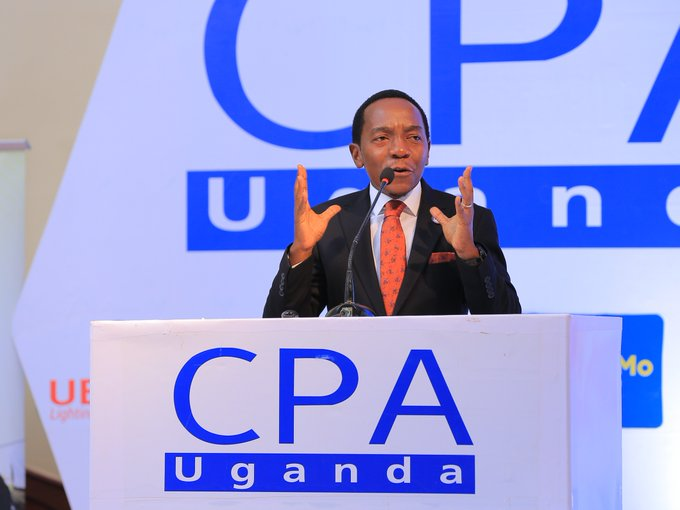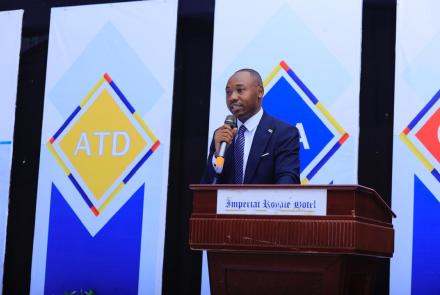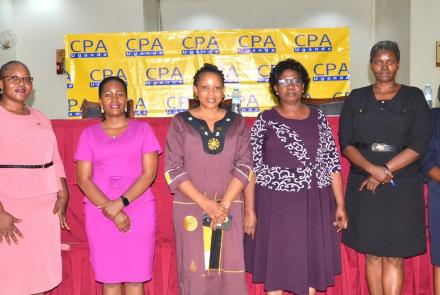By Joan Abaasa
Communications Officer- ICPAU
The earth is a state of chaos. Trees are declining in number and they are drying out fast. The earth is heating up at an alarming rate, plastic is chocking life in the seas, and the weather patterns are changing drastically.
According to Mr Stephen Mukasa, the Managing Director of CEO Summit Uganda, organisations must make deliberate efforts to control the impact of their activities on the environment, lest the earth plunges into destruction.
“Mother earth is in pain. We are experiencing a climate crisis, and if we do not act soon, we will soon be headed for destruction,” Mukasa noted.
While delivering a presentation on Sustainable Finance Immersion at the 29th Annual Seminar of the Institute of Certified Public Accountants of Uganda, Mukasa encouraged accountants to leverage sustainable finance to meet their organisations' financial goals and generate long-term value for society and the environment.
Mukasa’s discussion focused on how sustainable finance integrates Environmental, Social, and Governance (ESG) factors into financial decision-making, effectively aligning the finance system with broader sustainability objectives.
He highlighted the critical relationship between the finance sector and sustainability, explaining the sector's pivotal role in supporting government efforts to build a socially and environmentally sustainable economy.
Recent commitments from companies in the finance sector include funding projects with positive impacts, establishing collaborative initiatives, developing innovative financial instruments, and advocating for stronger government actions on climate change and biodiversity.
Despite these advancements, Mukasa pointed out significant barriers to progress. These include the prevailing emphasis on short-term financial performance over long-term sustainability, a lack of consensus on defining what constitutes green or sustainable investments, weaknesses in regulatory frameworks, and insufficient demand from customers and clients.
Mukasa elaborated on various green investments, including those aimed at reducing greenhouse gas emissions, like renewable energy, energy efficiency, green buildings, clean transportation, and forest preservation.
He also addressed initiatives focused on climate adaptation, such as urban infrastructure, climate-resilient agriculture, and climate-friendly agribusiness value chains, as well as efforts to tackle other environmental issues like biodiversity conservation and pollution prevention.
Participants were challenged to consider the steps they can take to ensure their financial decisions align with sustainable development goals. They were also advised that sustainability should be an integral part of financial metrics, offering a comprehensive approach to addressing environmental and social challenges.
Organised under the theme, Driving Sustainability and Trust, the 29th Annual Seminar runs from 4 – 6 September 2024 at the Imperial Resort Beach Hotel, and online. The aim is to spur the holistic development of accountants and other professionals by equipping them with skills in non-technical aspects such as organisational management, talent and health management, and entrepreneurship, among others. There are over 1,700 participants at the 29th ICPAU Annual Seminar.
In addition to Continuing Professional Development, the other activities at the Annual Seminar include the pronouncement on adoption of IFRS Sustainability Disclosure Standards, launch of the ICPAU Benevolent Fund, a farewell ceremony for John Bosco Ntangaare, the former ICPAU Director of Education, and the 2024 Accountancy Service Awards.
Partnering organisations include Uganda Electricty Distribution Company Ltd, Deposit Protection Fund, MTN Uganda, Bank of Uganda, Airtel Uganda, Kampala Capital City Authority, National Social Security Fund, Uganda Development Bank, National Agricultural Advisory Services, KPMG, Endeavour Africa, Ernst & Young, Ediomu & Co., Kalinda & Associates, Centenary Rural Development Bank, Standard Chartered Bank, Forvis Mazars, Insurance Regulatory Authority, Crowe AIA, Grant Thornton, Baker Tilly Hem LLP, PostBank Uganda, Electricity Regulatory Authority, Kakira Sugar Ltd, Uganda Civil Aviation Authority, Mengo Hospital, Uganda Electricity Tranmission Company Ltd, Uganda Law Reform Commission, Sebuuma & Associates and Summit Consulting Ltd.
END




